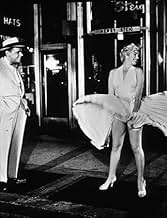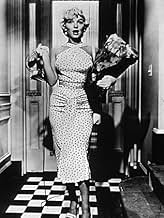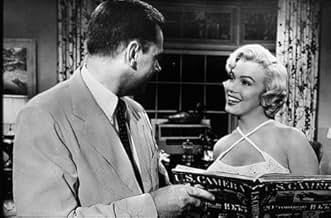VALUTAZIONE IMDb
7,0/10
44.739
LA TUA VALUTAZIONE
Quando la sua famiglia va via per l'estate, un marito che fino ad allora è stato fedele è tentato da una bella vicina.Quando la sua famiglia va via per l'estate, un marito che fino ad allora è stato fedele è tentato da una bella vicina.Quando la sua famiglia va via per l'estate, un marito che fino ad allora è stato fedele è tentato da una bella vicina.
- Nominato ai 1 BAFTA Award
- 2 vittorie e 3 candidature totali
Tom Ewell
- Richard Sherman
- (as Tommy Ewell)
Dolores Rosedale
- Elaine
- (as Roxanne)
Brandon Beach
- Commuter at Station
- (non citato nei titoli originali)
Steven Benson
- Kid at Train Station
- (non citato nei titoli originali)
George Bruggeman
- Commuter at Station
- (non citato nei titoli originali)
George Chester
- Porter
- (non citato nei titoli originali)
Noble 'Kid' Chissell
- Train Station Gateman
- (non citato nei titoli originali)
Richard Elmore
- Commuter at Station
- (non citato nei titoli originali)
Duke Fishman
- Commuter at Station
- (non citato nei titoli originali)
Recensioni in evidenza
Poor Richard Sherman's got himself in such a state, he's been mesmerised and is starting to fixate, a screen goddess lives upstairs, summertime is for affairs, now he's drinking, smoking, getting quite irate; as his wife has left the city for the country, and middle age makes him behave, quite dumbly, it's the itch of seven years, that's interfering with his gears, but just a scratch will turn his world, fragile and crumbly.
Fair play to him though, as I suspect most men in his position wouldn't behave the same way when presented with a new neighbour who's innocent exhibition and confiding character (along with a number of other engaging attributes) are so overwhelmingly enticing, especially to the archetypal 1950s middle aged man.
Fair play to him though, as I suspect most men in his position wouldn't behave the same way when presented with a new neighbour who's innocent exhibition and confiding character (along with a number of other engaging attributes) are so overwhelmingly enticing, especially to the archetypal 1950s middle aged man.
In summertime in Manhattan, the plain and average Richard Sherman (Tom Ewell) sends his wife and son for vacation in the country. Sherman is the key man of a publishing firm, Brady & Company, which publishes cheap pocket books. The faithful Sherman has a routine life with his family and dreams on being successful with women. When a beautiful and sexy blonde lodges the upstairs apartment of his small building, Sherman first opens the front door for her and then he invites her to have a drink with him after the fall of her tomato vase on his chair on the backyard. Along the days, he spends some time with the girl and feels tempted by her, but later he misses his family and travels to meet them.
"The Seven Year Itch" is a naive and innocent romantic comedy in accordance with the contemporary moral standards, but actually this feature tested the limits of censorship in a time when Hollywood was ruled by a rigid moral code. The story is based on a George Axelrod popular 1952 Broadway play about a man that has an affair with his upstairs neighbor. Unfortunately in the 50's, the American cinema did not have the same artistic freedom as theater. The screenplays and movies were submitted to the scrutiny of the powerful Hayes office, the censorship of Hollywood. There was a Production Code in Hollywood that stated that adultery should not be the subject of comedy or laughs, and this story violated the Code. Billy Wilder was fascinated by this story and purchased the rights of George Axelrod. However, to make the movie was a challenge for this great director, since many scenes and lines were ripped away by the censorship and by the National Legion of Decency, mutilating the plot.
Marilyn Monroe was selected to the cast, but Billy Wilder wanted a plain, average and non-handsome actor for the role of Sherman. His first choice was Walter Matthaus, but Fox direction did not want to take the risk of an unknown lead actor, therefore they selected Tom Ewell. The most famous scene of Marilyn Monroe, with her dress being lifted by the air of the subway, was first an exterior scene, but later Billy Wilder needed to shot again in the set because the noise and whistles of the viewers spoiled the original footage. This external scene also provoked the end of the marriage of Marilyn with Joe Dimaggio, who felt humiliated with the manifestation of the public.
One dialog that I particularly like is when Sherman and the blonde leave the movie theater and she says that the creature needed to be loved, in an analogy between Sherman and the creature of the black lagoon. The restored DVD is fantastic and this is the most sexually suggested role of Marilyn Monroe to date. My vote is seven.
Title (Brazil): "O Pecado Mora ao Lado" ("The Sin Lives on the Next Door")
"The Seven Year Itch" is a naive and innocent romantic comedy in accordance with the contemporary moral standards, but actually this feature tested the limits of censorship in a time when Hollywood was ruled by a rigid moral code. The story is based on a George Axelrod popular 1952 Broadway play about a man that has an affair with his upstairs neighbor. Unfortunately in the 50's, the American cinema did not have the same artistic freedom as theater. The screenplays and movies were submitted to the scrutiny of the powerful Hayes office, the censorship of Hollywood. There was a Production Code in Hollywood that stated that adultery should not be the subject of comedy or laughs, and this story violated the Code. Billy Wilder was fascinated by this story and purchased the rights of George Axelrod. However, to make the movie was a challenge for this great director, since many scenes and lines were ripped away by the censorship and by the National Legion of Decency, mutilating the plot.
Marilyn Monroe was selected to the cast, but Billy Wilder wanted a plain, average and non-handsome actor for the role of Sherman. His first choice was Walter Matthaus, but Fox direction did not want to take the risk of an unknown lead actor, therefore they selected Tom Ewell. The most famous scene of Marilyn Monroe, with her dress being lifted by the air of the subway, was first an exterior scene, but later Billy Wilder needed to shot again in the set because the noise and whistles of the viewers spoiled the original footage. This external scene also provoked the end of the marriage of Marilyn with Joe Dimaggio, who felt humiliated with the manifestation of the public.
One dialog that I particularly like is when Sherman and the blonde leave the movie theater and she says that the creature needed to be loved, in an analogy between Sherman and the creature of the black lagoon. The restored DVD is fantastic and this is the most sexually suggested role of Marilyn Monroe to date. My vote is seven.
Title (Brazil): "O Pecado Mora ao Lado" ("The Sin Lives on the Next Door")
The film succeeds mainly because of Marilyn Monroe's obvious charisma and appeal - she really shines in this as the dizzy, curvy blonde upstairs. Tom Ewell has been married seven years and has seen his wife and son away for the summer - he determines not to smoke, not to drink, and not to chase women. The moment Monroe wiggles up those stairs all that goes out of the window and he starts fantasising about the new arrival.
There are a lot of funny situations and you're never quite sure what it in Ewell's head and what is real (well, I wasn't anyway). I love the scene where they are playing Chopsticks and of course, that old chestnut the 2nd Rach concerto rears its head! Victor Moore plays a doddery plumber and Oscar Homolka a shrink who advises Ewell not to consider anything as drastic as murder until he can get simple problems sorted out, while Evelyn Keyes makes the most of her few appearances as Ewell's wife (or is she his conscience?!).
The film is fun, the famous skirt and grid scene is now legendary (but quite unlike the often-seen poster shot), and there is much in this bouncy production after nearly fifty years to entertain pretty much anyone.
There are a lot of funny situations and you're never quite sure what it in Ewell's head and what is real (well, I wasn't anyway). I love the scene where they are playing Chopsticks and of course, that old chestnut the 2nd Rach concerto rears its head! Victor Moore plays a doddery plumber and Oscar Homolka a shrink who advises Ewell not to consider anything as drastic as murder until he can get simple problems sorted out, while Evelyn Keyes makes the most of her few appearances as Ewell's wife (or is she his conscience?!).
The film is fun, the famous skirt and grid scene is now legendary (but quite unlike the often-seen poster shot), and there is much in this bouncy production after nearly fifty years to entertain pretty much anyone.
Something that irritates me about the IMBD is that if you criticise a movie that was made before 1980, a truckload of idiots send you messages telling you how much you hate old movies. Let me say right away, I don't. I like films from pretty much every era of cinema that I've had the chance to see, but, having had common sense recently installed, I've come to realise that age doesn't automatically make a movie great, just as modernity doesn't automatically make a movie bad.
So bearing in mind that I'm talking about this one movie, and not every movie made in the 1950s, The Seven Year Itch is as average as they come. The minimal plot sees Tom Ewell's `summer bachelor' trying to resist the charms of neighbour Marilyn Monroe while his wife and son are shipped off for the season. Very obviously adapted from a play, there are few characters, few sets, and even fewer laughs. That it succeeds at all is due to the charm of the leads and the occasional good joke that sneaks its way into the script.
The film's main problem comes in how it tells its story. First, it depends on Ewell constantly talking to himself, babbling on endlessly about what he's doing, what he might do, what he's never done, and what other people will think he's doing, done and about to do. Secondly, he is constantly daydreaming, the film constantly dissolving into one of his fantasies that are unfortunately no funnier than reality. If you find this storytelling approach irritating, as I did, the film's potential is lost immediately.
You'll no doubt be shocked to learn that in this film Marilyn Monroe is cast as a dumb blonde. Most people in the world seem to immediately pitch a trouser tent at the thought of Norma Jean, but I can't say I count myself among them. The problem with a dumb blonde is that she's dumb, so to find her attractive, you have to be attracted to stupidity. I'm not, so it doesn't matter how much she pouts, or how often we're treated to shots of her hourglass figure; she's as thick as a lobotomised footballer and therefore unattractive. She's basically got the personality and intelligence of a six year old, and, not being Gary Glitter, I can't say that appeals to me.
A comedy with few laughs, a sex symbol who doesn't float my boat, and a classic that just doesn't do it for me. I guess there's another bunch of snide messages coming my way.
So bearing in mind that I'm talking about this one movie, and not every movie made in the 1950s, The Seven Year Itch is as average as they come. The minimal plot sees Tom Ewell's `summer bachelor' trying to resist the charms of neighbour Marilyn Monroe while his wife and son are shipped off for the season. Very obviously adapted from a play, there are few characters, few sets, and even fewer laughs. That it succeeds at all is due to the charm of the leads and the occasional good joke that sneaks its way into the script.
The film's main problem comes in how it tells its story. First, it depends on Ewell constantly talking to himself, babbling on endlessly about what he's doing, what he might do, what he's never done, and what other people will think he's doing, done and about to do. Secondly, he is constantly daydreaming, the film constantly dissolving into one of his fantasies that are unfortunately no funnier than reality. If you find this storytelling approach irritating, as I did, the film's potential is lost immediately.
You'll no doubt be shocked to learn that in this film Marilyn Monroe is cast as a dumb blonde. Most people in the world seem to immediately pitch a trouser tent at the thought of Norma Jean, but I can't say I count myself among them. The problem with a dumb blonde is that she's dumb, so to find her attractive, you have to be attracted to stupidity. I'm not, so it doesn't matter how much she pouts, or how often we're treated to shots of her hourglass figure; she's as thick as a lobotomised footballer and therefore unattractive. She's basically got the personality and intelligence of a six year old, and, not being Gary Glitter, I can't say that appeals to me.
A comedy with few laughs, a sex symbol who doesn't float my boat, and a classic that just doesn't do it for me. I guess there's another bunch of snide messages coming my way.
A conclusion I came to some time ago (and that doesn't seem to be reflected in any of the other reviews here) is that the whole story is a dream, a waking fantasy, on the part of Richard Sherman (Tom Ewell). There were no scenes where there is any objective confirmation of the existence of the Marilyn Monroe character, where anyone else could confirm any of the events between them; even the scene where Kruhulik (Robert Strauss) walks in is just the three of them, and Kruhulik is drunk, thus unreliable as a witness. Add to that the fact that Marilyn's character has no actual name, and is only referred to in the credits as "the girl", leads me to believe that the whole thing is Sherman's fantasy, that "the girl" never actually existed, that it's all a guilt-driven fantasy on the part of a 39-year-old middle-class white guy confronted with a "summer bachelorhood" in the City without his family. 🤔😉😊
Lo sapevi?
- QuizBilly Wilder preferred shooting in black and white, but Marilyn Monroe's contract with Fox called for all of her movies to be shot in color. Monroe always thought that she looked far more attractive and glamorous in color than in black and white.
- BlooperBoth Richard and his boss, who are in the book publishing industry, refer to "The Portrait of Dorian Gray". The actual title of the Oscar Wilde novel is "The Picture of Dorian Gray".
- Curiosità sui creditiWhen the title appears, one arm of the T in ITCH reaches down and scratches the stem of the letter.
- Versioni alternativeVersion released in then West Germany contains some profanity.
- ConnessioniFeatured in Marilyn (1963)
- Colonne sonorePiano Concerto #2
Composed by Sergei Rachmaninoff (as S. Rachmaninoff)
Played on a record and often in the score
I più visti
Accedi per valutare e creare un elenco di titoli salvati per ottenere consigli personalizzati
Dettagli
- Data di uscita
- Paese di origine
- Lingua
- Celebre anche come
- La comezón del séptimo año
- Luoghi delle riprese
- 164 East 61st Street, Manhattan, New York, New York, Stati Uniti(exterior of Richard's apartment)
- Aziende produttrici
- Vedi altri crediti dell’azienda su IMDbPro
Botteghino
- Budget
- 1.800.000 USD (previsto)
- Lordo in tutto il mondo
- 22.277 USD
- Tempo di esecuzione1 ora 45 minuti
- Colore
- Proporzioni
- 2.55 : 1
Contribuisci a questa pagina
Suggerisci una modifica o aggiungi i contenuti mancanti

Divario superiore
What is the Hindi language plot outline for Quando la moglie è in vacanza (1955)?
Rispondi



































